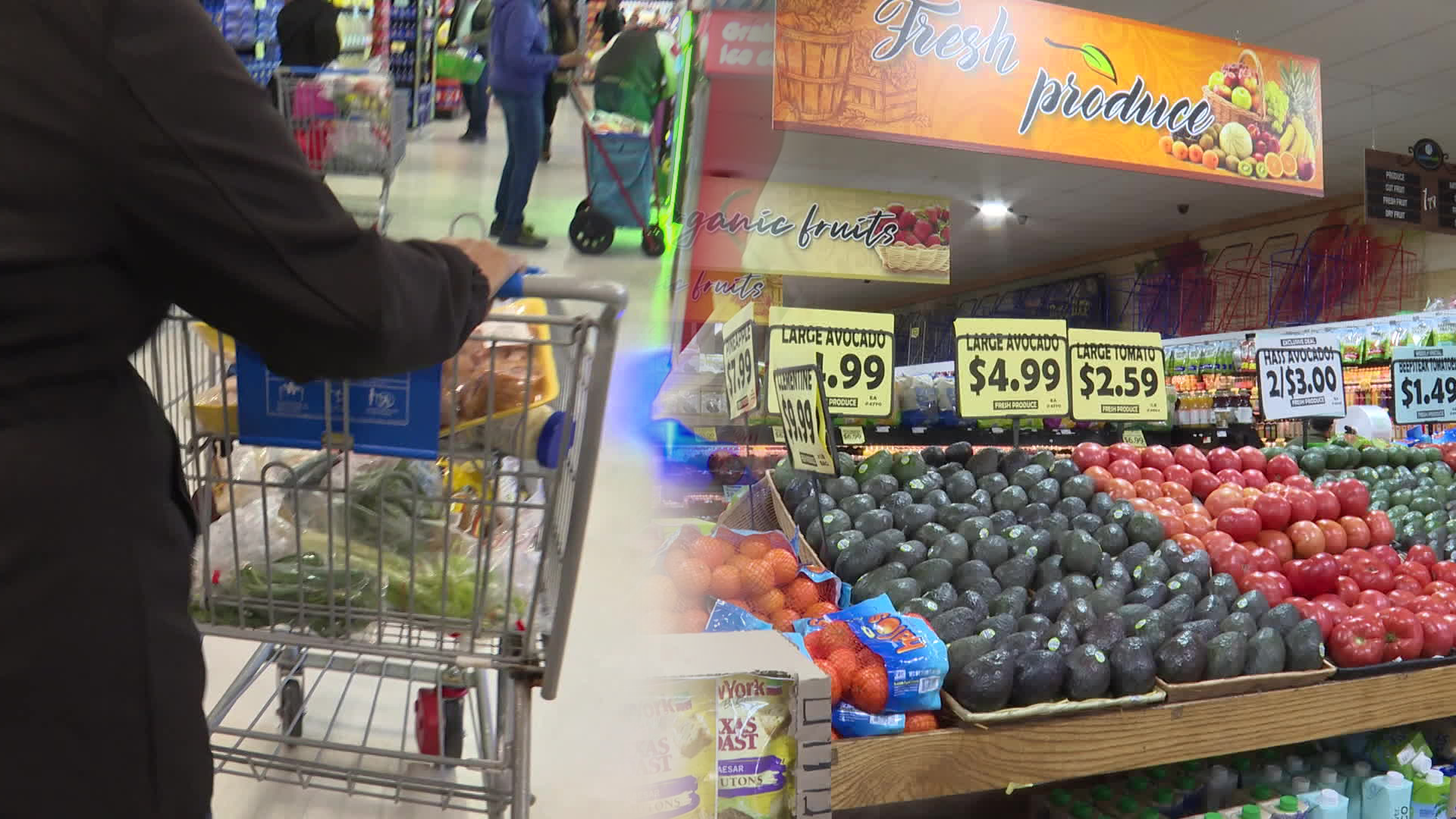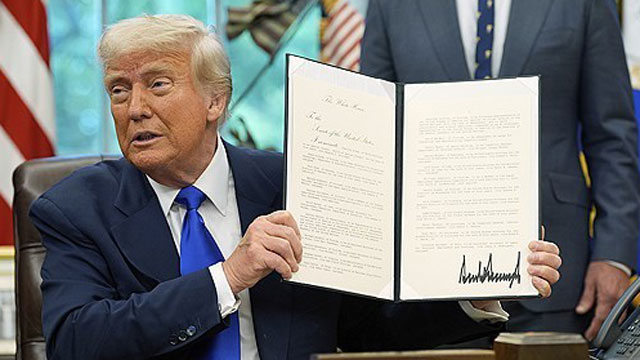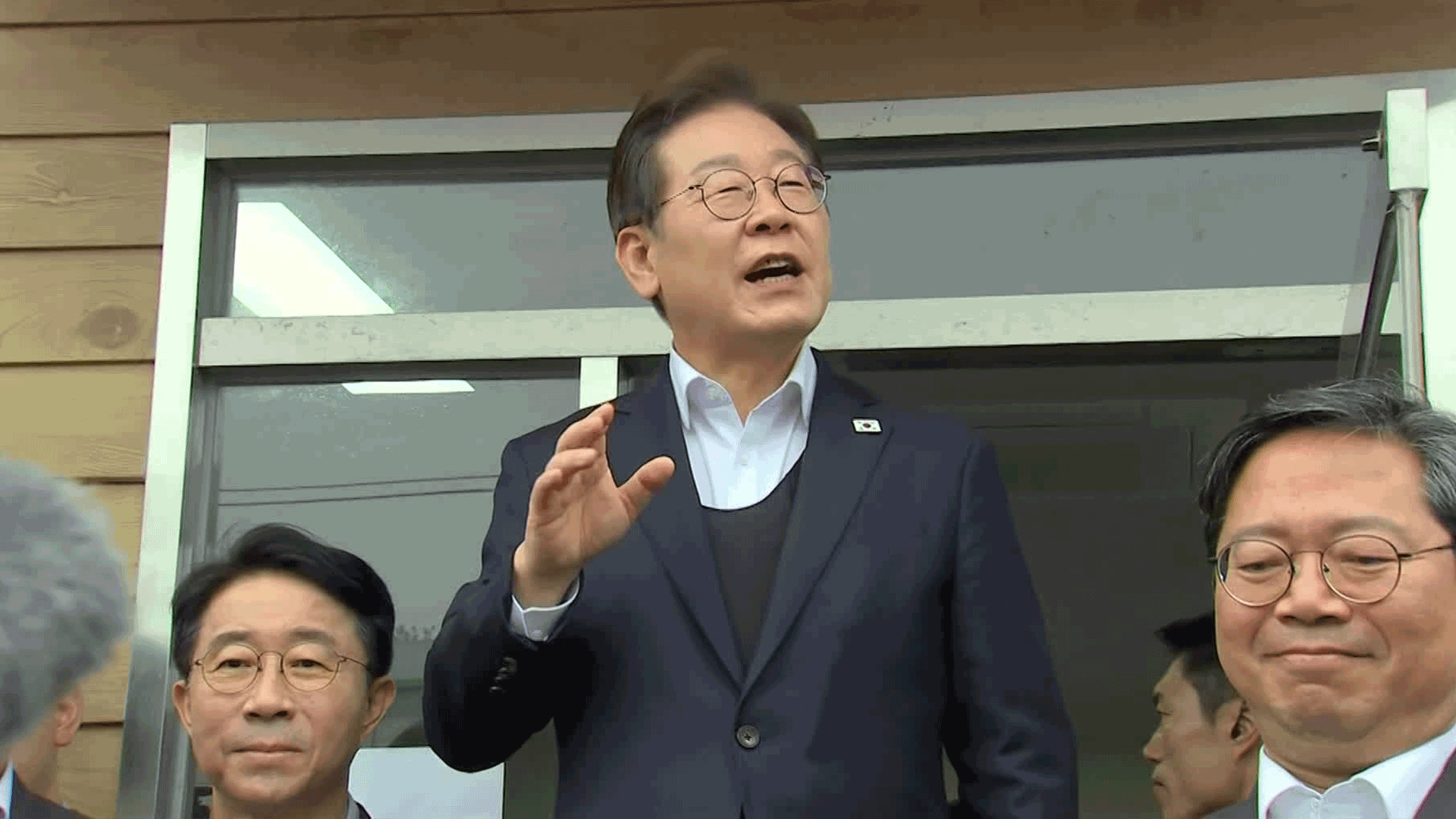[Anchor]
Due to these tariff impacts, prices in the United States are also fluctuating.
The consumer prices of some items are rising.
Currently, there is still inventory available, so it is manageable, but it seems that the shock will be greater when the inventory runs out in a few months.
Our correspondent Park Il-jung reports from New York.
[Report]
This is a supermarket in New York.
The prices of vegetables imported from Latin America have risen by about 10%.
Unlike manufactured goods, these items are not stockpiled, so they are immediately affected by tariffs.
[Han Gyu-ho/CEO of Key Food: "The expiration date changes weekly, so we can't predict how prices will go up or down."]
Now, tariffs are gradually affecting the prices of everyday goods.
The price of these food containers imported from China has increased by more than 10% compared to before.
Even if shops want to secure more items now, it is difficult to receive the desired amount from importers, and they have to pay the full price for wholesale items that they used to buy at a lower price.
Even products imported before the tariffs are now seeing importers start to adjust quantities and raise prices.
[Kim Nam-yong/Manager of Super Fresh Flatbush: "Starting next month, there will be no promotions. Everything will have to be purchased at regular prices."]
In some cases, it would be fortunate if items can be imported.
This company, which imports various miscellaneous goods from China, is only storing the contracted bags and hats in a warehouse in China across the Pacific.
After paying all the tariffs to bring them into the U.S., there is no possibility of selling them.
[Richard Kim/CEO of Kipa Group: "For example, if I used to sell one for $10, can I bring it in and sell it for about $25? Even if I say I will sell it for $20 at a loss, customers will say they won't buy it."]
With concerns that prices will rise further, consumers are tightening their spending.
[Cindy/Brooklyn resident in New York: "We have to go to different stores now just to find sales and deals that works around our budget. So where to when you would go to one grocery store, now you've gotta go to five."]
As shipments from China to the U.S. have decreased by about half since last month, the upward trend in prices is expected to accelerate.
This is Park Il-jung reporting for KBS News from New York.
Due to these tariff impacts, prices in the United States are also fluctuating.
The consumer prices of some items are rising.
Currently, there is still inventory available, so it is manageable, but it seems that the shock will be greater when the inventory runs out in a few months.
Our correspondent Park Il-jung reports from New York.
[Report]
This is a supermarket in New York.
The prices of vegetables imported from Latin America have risen by about 10%.
Unlike manufactured goods, these items are not stockpiled, so they are immediately affected by tariffs.
[Han Gyu-ho/CEO of Key Food: "The expiration date changes weekly, so we can't predict how prices will go up or down."]
Now, tariffs are gradually affecting the prices of everyday goods.
The price of these food containers imported from China has increased by more than 10% compared to before.
Even if shops want to secure more items now, it is difficult to receive the desired amount from importers, and they have to pay the full price for wholesale items that they used to buy at a lower price.
Even products imported before the tariffs are now seeing importers start to adjust quantities and raise prices.
[Kim Nam-yong/Manager of Super Fresh Flatbush: "Starting next month, there will be no promotions. Everything will have to be purchased at regular prices."]
In some cases, it would be fortunate if items can be imported.
This company, which imports various miscellaneous goods from China, is only storing the contracted bags and hats in a warehouse in China across the Pacific.
After paying all the tariffs to bring them into the U.S., there is no possibility of selling them.
[Richard Kim/CEO of Kipa Group: "For example, if I used to sell one for $10, can I bring it in and sell it for about $25? Even if I say I will sell it for $20 at a loss, customers will say they won't buy it."]
With concerns that prices will rise further, consumers are tightening their spending.
[Cindy/Brooklyn resident in New York: "We have to go to different stores now just to find sales and deals that works around our budget. So where to when you would go to one grocery store, now you've gotta go to five."]
As shipments from China to the U.S. have decreased by about half since last month, the upward trend in prices is expected to accelerate.
This is Park Il-jung reporting for KBS News from New York.
■ 제보하기
▷ 카카오톡 : 'KBS제보' 검색, 채널 추가
▷ 전화 : 02-781-1234, 4444
▷ 이메일 : kbs1234@kbs.co.kr
▷ 유튜브, 네이버, 카카오에서도 KBS뉴스를 구독해주세요!
- Tariffs drive U.S. price rise
-
- 입력 2025-05-03 05:20:33

[Anchor]
Due to these tariff impacts, prices in the United States are also fluctuating.
The consumer prices of some items are rising.
Currently, there is still inventory available, so it is manageable, but it seems that the shock will be greater when the inventory runs out in a few months.
Our correspondent Park Il-jung reports from New York.
[Report]
This is a supermarket in New York.
The prices of vegetables imported from Latin America have risen by about 10%.
Unlike manufactured goods, these items are not stockpiled, so they are immediately affected by tariffs.
[Han Gyu-ho/CEO of Key Food: "The expiration date changes weekly, so we can't predict how prices will go up or down."]
Now, tariffs are gradually affecting the prices of everyday goods.
The price of these food containers imported from China has increased by more than 10% compared to before.
Even if shops want to secure more items now, it is difficult to receive the desired amount from importers, and they have to pay the full price for wholesale items that they used to buy at a lower price.
Even products imported before the tariffs are now seeing importers start to adjust quantities and raise prices.
[Kim Nam-yong/Manager of Super Fresh Flatbush: "Starting next month, there will be no promotions. Everything will have to be purchased at regular prices."]
In some cases, it would be fortunate if items can be imported.
This company, which imports various miscellaneous goods from China, is only storing the contracted bags and hats in a warehouse in China across the Pacific.
After paying all the tariffs to bring them into the U.S., there is no possibility of selling them.
[Richard Kim/CEO of Kipa Group: "For example, if I used to sell one for $10, can I bring it in and sell it for about $25? Even if I say I will sell it for $20 at a loss, customers will say they won't buy it."]
With concerns that prices will rise further, consumers are tightening their spending.
[Cindy/Brooklyn resident in New York: "We have to go to different stores now just to find sales and deals that works around our budget. So where to when you would go to one grocery store, now you've gotta go to five."]
As shipments from China to the U.S. have decreased by about half since last month, the upward trend in prices is expected to accelerate.
This is Park Il-jung reporting for KBS News from New York.
Due to these tariff impacts, prices in the United States are also fluctuating.
The consumer prices of some items are rising.
Currently, there is still inventory available, so it is manageable, but it seems that the shock will be greater when the inventory runs out in a few months.
Our correspondent Park Il-jung reports from New York.
[Report]
This is a supermarket in New York.
The prices of vegetables imported from Latin America have risen by about 10%.
Unlike manufactured goods, these items are not stockpiled, so they are immediately affected by tariffs.
[Han Gyu-ho/CEO of Key Food: "The expiration date changes weekly, so we can't predict how prices will go up or down."]
Now, tariffs are gradually affecting the prices of everyday goods.
The price of these food containers imported from China has increased by more than 10% compared to before.
Even if shops want to secure more items now, it is difficult to receive the desired amount from importers, and they have to pay the full price for wholesale items that they used to buy at a lower price.
Even products imported before the tariffs are now seeing importers start to adjust quantities and raise prices.
[Kim Nam-yong/Manager of Super Fresh Flatbush: "Starting next month, there will be no promotions. Everything will have to be purchased at regular prices."]
In some cases, it would be fortunate if items can be imported.
This company, which imports various miscellaneous goods from China, is only storing the contracted bags and hats in a warehouse in China across the Pacific.
After paying all the tariffs to bring them into the U.S., there is no possibility of selling them.
[Richard Kim/CEO of Kipa Group: "For example, if I used to sell one for $10, can I bring it in and sell it for about $25? Even if I say I will sell it for $20 at a loss, customers will say they won't buy it."]
With concerns that prices will rise further, consumers are tightening their spending.
[Cindy/Brooklyn resident in New York: "We have to go to different stores now just to find sales and deals that works around our budget. So where to when you would go to one grocery store, now you've gotta go to five."]
As shipments from China to the U.S. have decreased by about half since last month, the upward trend in prices is expected to accelerate.
This is Park Il-jung reporting for KBS News from New York.
-
-

박일중 기자 baikal@kbs.co.kr
박일중 기자의 기사 모음
-
이 기사가 좋으셨다면
-
좋아요
0
-
응원해요
0
-
후속 원해요
0















이 기사에 대한 의견을 남겨주세요.